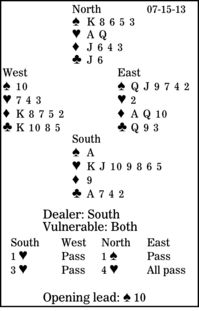Bridge column, July 15: Use "trade" to play better bridge

When you are the declarer, good plans will often help to make a clear-cut dream -- bringing home the contract -- come true. To do that, you do not need nine keys; five are sufficient: Track your tricks (count losers and winners), Read the lead, audition the Auction, anticipate possible Dangers, and watch your Entries.
Let's start with track your tricks and read the lead. How should South play in four hearts after West leads the spade 10 around to declarer's bare ace?
Although South has only 12 high-card points, his hand is worth a jump rebid. This typically promises seven winners, which his hand has: one spade, five hearts and one club.
South has four losers: one diamond and three clubs, though he seems to have 10 winners: two spades, seven hearts and one club. However, here, if declarer draws two rounds of trumps ending on the board and discards, say, the diamond nine on the spade king, he goes down. West ruffs, and later South concedes three clubs.
When the opening lead is a spot card in dummy's first-bid suit, it will usually be a singleton. Declarer should immediately cash the club ace and play another club (or duck the first round of clubs).
East does best to win, cash the diamond ace, and lead a spade. Yes, shifting to a trump stops an overtrick, but here South might carelessly ruff low, allowing West to overruff and play a trump.
Use "trade" to improve your play -- our theme this week.
** ** **
COPYRIGHT: 2013, UNITED FEATURE SYNDICATE
DISTRIBUTED BY UNIVERSAL UCLICK FOR UFS

